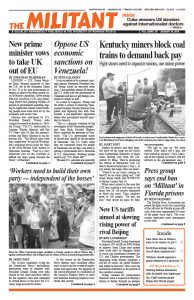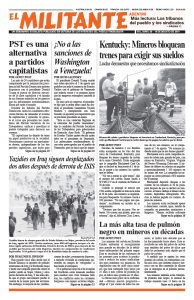LONDON — U.K. Prime Minister Boris Johnson promised to take the U.K. out of the European Union by Oct. 31 as his new government attempts to address the deep-seated crisis of British capitalism. After taking office he set off on a U.K. tour, promising Brexit and pledging billions of pounds in government spending, hoping to regenerate regions where working people have been hard hit by the economic and social crisis.
Johnson was welcomed by U.S. President Donald Trump, who claimed he would be known as “Britain Trump.” The U.S. ambassador to London, Woody Johnson, told Fox TV News July 30 that the administration saw Boris Johnson as an important ally. “The British have been very supportive” he said of Washington’s proposed naval escort for ships in the Arab-Persian Gulf, known as Operation Sentinel. “They’re a very important part of the coalition to defend the ships going through the Strait,” of Hormuz.
Leaders of the main EU member states and Brussels bureaucracy were less welcoming, having sought to punish the U.K. government for taking steps towards quitting the EU. Michel Barnier, the EU’s Brexit negotiator, said Johnson’s terms for talks on the U.K.’s departure from the protectionist trading bloc were “unacceptable.”
The left of capitalist politics and media in the U.K. have described the new government as the “most right-wing” in decades, even “fascist.”
It’s anything but that. Johnson is a “one nation” Conservative, promoting cross-class unity in the so-called national interest. Much of the political ground he occupies — increased funding for education and health and recruiting thousands more cops — is similar that of the Labour Party.
In addition, he has pledged an amnesty for 500,000 undocumented immigrants and continued residency in the U.K. after Brexit for EU nationals.
Johnson’s victory appeared to give the Conservative Party a boost in the polls. In Aug. 1 by-election in the mid-Wales constituency of Brecon and Radnorshire the Conservatives polled four times the vote of the Brexit Party. The election was won by the Liberal Democrats, which garnered votes from a coalition of parties that support the U.K. remaining in the EU. Johnson’s governing Conservatives came in second. Labour under leader Jeremy Corbyn leans towards “remain.” The party is dogged by its protection of anti-Semites in and outside the party, and is bereft of answers to Johnson. It won just 5% of the by-election vote, coming in fourth.
But the “Boris bounce” touted by the press was not in evidence when Communist League members campaigned in Harlow, Essex, just north of London, Aug. 3. “They’re all the same,” shop worker Jackie Gunner said. “They promise everything and give us nothing. They look after their interests at our expense.”
Johnson faces the same political realities that beset previous administrations: the U.K.’s disproportionate decline in relation to its capitalist rivals; the capitalist world disorder, in which the European Union itself is being torn apart; and the rulers’ concern about what’s brewing among working people, who are being hammered by the impact of the capitalist crisis.
The British rulers were unable to prevent the Iranian Revolutionary Guard from seizing a British tanker in the Gulf last month. Today the U.K. navy has just 40 ships in operation — half its size during the 1982 Falklands/Malvinas War.
Factional divisions over EU
The dominant sections of the British ruling class cling to EU membership. They aim to thwart the 2016 referendum vote to quit the EU. They are doing this through scare stories about what its impact would be on jobs, availability of food and medicines and broader economic dislocation; proposals for a second referendum; and maneuvers in Parliament where the government has a majority of only one and the bulk of Members of Parliament are “remainers.” Factional divisions over the European Union increasingly outweigh party loyalty.
Johnson has also been forced to address fault lines that threaten a breakup of the United Kingdom. Declaring himself “Minister for the Union,” the prime minister visited Scotland and Northern Ireland where large “remain” majorities were scored in the 2016 EU referendum. The Scottish National Party has called for a new vote on Scotland’s independence from the U.K. Johnson has revived his own calls for increased devolution of political powers to assemblies in Northern Ireland, Scotland and Wales.
The previous government of Theresa May had proposed avoiding border checks between Northern Ireland and the Republic of Ireland, allowing the free movement of goods across the island and keeping the U.K. in a customs union with the EU until they both agree to end it. Johnson rejects May’s arrangement.
A return to a hard border disrupting trade and social communication between Northern Ireland and the Republic of Ireland will see a step up in calls for a united Ireland.
Johnson also visited Wales where farmers told him they would face tariffs of 46% to 65% in the event of the U.K. leaving the EU with no trade deal. One third of UK sheep meat production goes to countries in the EU. Johnson pledged financial backing to the farmers and said his government might support continued U.K. membership in the EU’s single market and customs union for a “couple of years.”
“We shouldn’t be looking to any capitalist government, which just looks after the interests of the ruling rich,” Communist League member Julie Crawford told Harlow worker Saidh Miah, 38, who said he was opposed to the war moves against Iran. “On all matters — foreign policy and domestic — what’s needed is an independent working-class course — from getting out of the EU now, leaving Ireland to the Irish, to building and strengthening the trade unions,” Crawford added.

